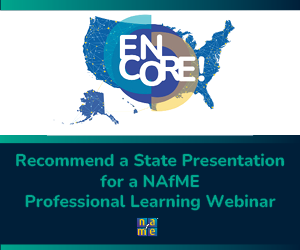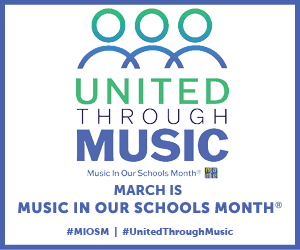NAfME BLOG
Higher Education at a Turning Point: Policy Shifts Shaping the Future of Dance Education

/ News Posts / Higher Education at a Turning Point: Policy Shifts Shaping the Future of Dance Education
Higher Education at a Turning Point
Policy Shifts Shaping the Future of Dance Education
Amanda Karhuse’s Policy Update from the National Dance Education Organization’s (NDEO) 2025 National Conference
By Amber Friel, NAfME Communications Manager, Advocacy and Public Policy
As higher education undergoes significant policy changes, arts educators are navigating an evolving landscape that directly impacts how they teach, support students, and sustain their programs. From shifts in federal guidance on Diversity, Equity, and Inclusion (DEI) to major changes in Title IX, financial aid eligibility, and research funding, these developments carry broad implications, especially for arts disciplines rooted deeply in access, expression, and community.
At the National Dance Education Organization’s (NDEO) 2025 National Conference in Detroit (October 3–6), Amanda Karhuse, Assistant Executive Director for Advocacy and Public Policy at NAfME, delivered a timely presentation titled “Higher Education at a Turning Point: Policy Shifts Shaping the Future of Dance Education.” In addition to two other sessions covering state and federal policy updates impacting K–12 education, Amanda took the stage to outline how these ongoing shifts are influencing access, equity, and funding in higher education—and, by extension, in arts and dance education programs nationwide. A fellow member of the Arts Education Alliance, NDEO shares NAfME’s dedication to advancing the value of arts education through joint advocacy.
“It was inspiring to speak with a room full of advocates and educators who, despite being so deeply impacted by these policy changes, are as committed as ever to securing a vibrant future for arts education,” said Amanda Karhuse. “Conversations like these are powerful reminders of why our work with the Arts Education Alliance matters, and they push us to keep working toward meaningful, lasting change.”
Below is a summary of the key federal policy changes Amanda highlighted during her higher education session.
DEI and Civil Rights Policy Shifts
The Trump administration began its term by signing an executive order calling to eliminate federal DEI initiatives and terminate equity-related grants and contracts. A later “Dear Colleague” letter gave educational institutions just two weeks to assess compliance with civil rights laws or risk losing federal funding. Although a federal court has temporarily blocked enforcement, institutions remain cautious of ongoing oversight and potential consequences.
Meanwhile, Department of Justice guidance has flagged practices like cultural competence requirements and diversity statements as legally risky. Ongoing Title VI investigations are targeting admissions policies, scholarships, and allegations of shared ancestry discrimination. Some universities have already been fined and ordered to revise faculty hiring practices and institutional neutrality standards.
Title IX Reversal and LGBTQ+ Protections
In early 2025, the U.S. Department of Education reinstated the 2020 Title IX rule after a federal court vacated the Biden-era rule that had expanded protections for LGBTQ+ students. The reverted rule narrows the definition of sexual harassment and brings back live hearings for misconduct cases. Institutions must now comply with these older standards, which offer fewer protections for LGBTQ+ students and alter procedures for handling discrimination and harassment claims.
Cuts to Research and Teacher Preparation
This year saw drastic cuts to the Institute of Education Sciences (IES) and federal teacher preparation programs. The Department of Government Efficiency (DOGE) slashed millions in research funding, terminated about 90% of the IES workforce, and proposed a 67% cut to its overall budget. More than 100 teacher preparation grants were also canceled. Although legal challenges followed, the Supreme Court ultimately allowed the grant terminations to proceed, significantly disrupting research and teacher training pipelines.
Federal Workforce Reductions and Financial Aid Concerns
The Department of Education has undergone major staffing reductions, shrinking from more than 4,100 employees to roughly 2,183. Key offices, including Federal Student Aid and the Office for Civil Rights, have been affected. With the government shutdown that began October 1, furloughed staff may lose their positions permanently, raising alarms about the Department’s capacity to distribute aid and enforce civil rights protections.
The “Big Beautiful Bill Act” and Pell Grant Changes
Signed into law on July 4, the “Big Beautiful Bill Act” introduced wide-ranging fiscal changes, extending tax cuts and increasing border enforcement funding. To offset these costs, the law cut funding for several federal programs. Pell Grant eligibility has been narrowed to disqualify students with full state scholarships or high financial aid index scores. A new student loan repayment plan—spanning 10 to 25 years based on loan amounts—was introduced, and loan eligibility was restricted to students in higher-earning programs. These changes are expected to impact many associate’s degree pathways, particularly in education.
FY 2026 Appropriations and Government Shutdown
With Congress failing to pass a continuing resolution before the fiscal year (FY 2026) began, the government shut down on October 1. As a result, 95% of Department of Education staff were set to be furloughed, halting civil rights investigations and new grantmaking activities. While essential functions like Pell Grant and direct loan disbursement continue, the Department is operating with minimal staffing, and ongoing program oversight is severely limited.
Trump Administration’s Proposed Budget Cuts
The administration’s proposed FY 2026 budget calls for a 22.6% cut to non-defense discretionary spending, including a $12 billion reduction to the Department of Education. Key education programs targeted for elimination include Teacher Quality Partnership Grants, the Augustus F. Hawkins Centers for Excellence, Strengthening HBCUs, Federal TRIO Programs, GEAR UP, and the Supplemental Educational Opportunity Grant (SEOG). These cuts would diminish support for students with financial need and reduce resources for educator preparation, particularly at minority-serving institutions.
Legislative Support for Arts Education and Teacher Preparation
 Despite the current policy environment, several members of Congress continue to champion the arts and support teacher preparation. Rep. Jennifer McClellan (VA-4) introduced the Teacher and School Leader Quality Partnership Grants Act (H.R. 1331) to improve teacher preparation through evidence-based practices and stronger evaluation. Rep. Alma Adams (NC-12), formerly an HBCU art professor for four decades, proposed the HBCU Arts Act (H.R. 2664) to expand arts and cultural program funding at Historically Black Colleges and Universities. Rep. Sydney Kamlager-Dove (CA-37) introduced the Equitable Arts Education Enhancement Act (H.R. 5399), which supports arts education at minority-serving institutions through mentoring, student teacher stipends, and professional learning—legislation shaped in part by the Arts Education Alliance.
Despite the current policy environment, several members of Congress continue to champion the arts and support teacher preparation. Rep. Jennifer McClellan (VA-4) introduced the Teacher and School Leader Quality Partnership Grants Act (H.R. 1331) to improve teacher preparation through evidence-based practices and stronger evaluation. Rep. Alma Adams (NC-12), formerly an HBCU art professor for four decades, proposed the HBCU Arts Act (H.R. 2664) to expand arts and cultural program funding at Historically Black Colleges and Universities. Rep. Sydney Kamlager-Dove (CA-37) introduced the Equitable Arts Education Enhancement Act (H.R. 5399), which supports arts education at minority-serving institutions through mentoring, student teacher stipends, and professional learning—legislation shaped in part by the Arts Education Alliance.
Amanda Karhuse’s presentation underscored just how important continued advocacy, strong partnerships, and collective action are for protecting and expanding equitable access to the arts in higher education. Even as the policy landscape remains challenging, NAfME, the Arts Education Alliance, and our fellow advocates are committed to showing up, day after day, for arts education. Whether the work happens in classrooms, courtrooms, or on Capitol Hill, we’re in it for the long haul, pushing to ensure that music and the arts not only stay in our schools but truly thrive.
continued advocacy, strong partnerships, and collective action are for protecting and expanding equitable access to the arts in higher education. Even as the policy landscape remains challenging, NAfME, the Arts Education Alliance, and our fellow advocates are committed to showing up, day after day, for arts education. Whether the work happens in classrooms, courtrooms, or on Capitol Hill, we’re in it for the long haul, pushing to ensure that music and the arts not only stay in our schools but truly thrive.
Did this blog spur new ideas for your advocacy? Share them on Connect! Interested in reprinting this article? Please review the reprint guidelines.
Published Date
October 21, 2025
Category
- Advocacy
- Diversity, Equity, Inclusion, and Access (DEIA)
- Federal Advocacy & Public Policy
- Gender
- Race
- Sexuality
Copyright
October 21, 2025. © National Association for Music Education (NAfME.org)



